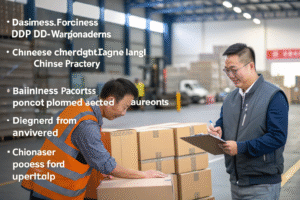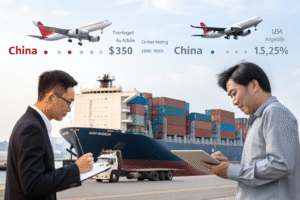Shipping from China requires more than just packaging and choosing the right freight forwarder—it depends on having your paperwork in perfect order. Without the correct export documents, your shipment could be delayed, fined, or even rejected at customs.
The right export documents protect your goods, reduce customs risk, and ensure your shipment reaches its destination without costly delays.
At GeeseCargo, we guide clients through the maze of Chinese export paperwork to make global shipping seamless. Let’s walk through the essential documents every exporter must prepare.
What Are the Core Commercial Documents Required?
Every international shipment from China must include commercial documentation that outlines the transaction value, shipment details, and product description.

What Is a Commercial Invoice and Why Is It Crucial?
The commercial invoice is the backbone of any international trade transaction. It lists:
- Buyer and seller details
- HS codes
- Unit price and total value
- Payment terms
- Shipping terms (e.g., FOB, CIF)
It’s required by both Chinese customs and the importing country. Inaccuracies in the invoice—such as undervalued goods or mismatched product descriptions—can trigger customs audits.
You can find templates and compliance tips from Export.gov.
What Is a Packing List and How Does It Help?
The packing list complements the invoice by detailing:
- Quantity of cartons
- Weight (gross and net)
- Dimensions
- Package markings and content descriptions
Although not a legal document, customs agents use it to cross-check physical inspections. Freight forwarders like GeeseCargo also rely on packing lists for planning space in containers.
You can generate bilingual packing lists via platforms like Alibaba logistics tools or standard Excel templates.
Which Transport Documents Are Needed for Shipping?
Transport documents link the goods to the carrier and serve as a contract, proof of ownership, and receipt of cargo.

What Is a Bill of Lading and Why Does It Matter?
A Bill of Lading (B/L) is issued by the carrier (or freight forwarder) and has three core functions:
- Acts as a shipping contract
- Serves as cargo receipt
- Transfers title of goods (when negotiable)
There are two types:
- Original B/L: Must be physically presented to release goods
- Telex release: Electronic release without physical documents
A common error is incorrect consignee details, which can cause delays at destination ports. For insight, review Maersk’s B/L tutorial.
What About the Air Waybill or Sea Waybill?
For air freight, the equivalent is the Air Waybill (AWB), a non-negotiable document issued by the airline. For LCL or sea freight without ownership transfer, you might receive a Sea Waybill, which simplifies customs clearance.
These documents include flight/voyage numbers, cargo weight, and shipper/consignee data. They're essential for tracking cargo and meeting import country customs regulations.
What Government-Issued Documents Are Required in China?
Beyond commercial and transport paperwork, you need certain government documents for regulatory compliance and customs release.

What Is the Export Declaration (Customs Declaration)?
In China, exporters must submit a Customs Declaration Form (报关单) via China’s electronic customs portal. It includes:
- HS codes
- Export license info
- FOB value
- Exporter registration
Only a licensed freight forwarder or customs broker (like GeeseCargo) can submit this document. Learn more from the China Customs official site.
Failure to declare correctly can result in penalties or shipment seizure.
When Is a Certificate of Origin Needed?
Some countries require a Certificate of Origin (COO) to qualify for preferential tariff treatment under trade agreements (like ASEAN-China or RCEP).
Issued by authorized bodies (e.g., CCPIT), it certifies the product’s Chinese origin. For example, exports to the EU may qualify for GSP benefits with Form A. Check current COO requirements via China Council for the Promotion of International Trade.
Are Any Other Documents or Certificates Common?
Depending on your cargo type, you may need compliance or quality-related documents for entry into destination markets.

What Are Product-Specific Certificates?
Certain products require:
- Fumigation Certificates for wooden packaging
- MSDS for chemicals and batteries
- CE Certificates for electronics sold in the EU
- FDA Compliance for food and medical goods to the US
Exporters can obtain these from accredited testing labs like SGS or TÜV Rheinland.
Failure to provide these may result in denied entry or additional inspection fees.
What About Insurance Certificates?
For shipments under CIF terms (Cost, Insurance, and Freight), buyers often request proof of insurance. This is issued by marine insurance providers and outlines:
- Cargo value
- Insured amount
- Policy terms
- Geographic coverage
Having this certificate helps in case of damage claims. GeeseCargo provides optional insurance policies on request through trusted underwriters.
Conclusion
Exporting from China requires more than knowing your logistics partner—it demands precision in paperwork. From commercial invoices and packing lists to customs declarations and product certificates, every document plays a role in avoiding delays and penalties.
At GeeseCargo, we guide exporters step-by-step through documentation, so you can ship with confidence and compliance. Need help preparing your next shipment? Our team is ready to support your export success.









